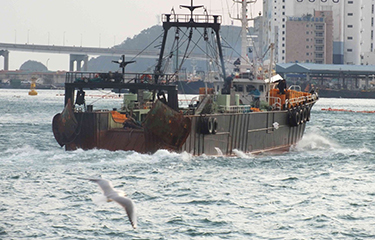An investigation by the Advocate for Public Interest Law (APIL) and the Environmental Justice Foundation (EJF) has found that migrant workers onboard South Korea’s distant-water fishing fleet – which fishes for products eventually shipped to the U.S., European Union, and United Kingdom – are subject to abuse.
The investigation of 40 vessels – of which 29 are authorized to export to the E.U. and U.K. – found that the crew of many vessels reported “violent attacks and illegal activities,” a release from the two organizations said. Of 54 Indonesian former crew interviewed, more than a quarter reported experiencing physical abuse, and 63 percent reported verbal abuse.
“The Korean distant-water fleet exports tens of millions of dollars worth of seafood to the U.S.a. and Europe every year, raising serious concerns for suppliers, retailers, and consumers in these countries,” the release states. “EJF and APIL are calling for urgent reforms to improve transparency in the sector to protect migrant workers and end illegal fishing.”
The investigation also showed that over half of the workers were forced to work in excess of 18 hours a day, and almost all of the workers interviewed reported that they had their passports confiscated by their captain and had several months wages deducted at the start of contracts, “to discourage them from escaping these abusive environments.”
“When unloading fish, we need to get into the freezer, and it is very cold, even after we put on three layers of coats, we are still freezing,” an Indonesian fisher told EJF. “Since the freezer is very cold, we need to get out a bit to get some warmth and avoid getting frozen, but the supervisor will slap or hit us if we do that.”
In addition to the abuse allegations, the APIL and EJF reported that a third of the vessels investigated were accused of fishing illegally – either by operating in unauthorized areas or targeting marine mammals.
“When [fishing illegally], we got loads of fish, sometimes we have to work two days [and] two nights without sleeping,” a worker on board one of the vessels said. “The captain, supervisor, and Korean crews caught seals too, they took teeth, genitals, and liver to eat. During [the] six months operating, the vessel caught about 200 seals.”
Many of the vessels involved in the abuse and illegal fishing are are certified to export to the E.U., U.K., and U.S., the two organizations said. The organizations are calling for South Korea to ratify the International Labour Organization’s Work in Fishing Convention (ILO C188) – a new inspection regime for vessels – and the mandatory installation of electronic monitoring on distant-water vessels.
“Companies and countries across the world should take urgent action to ensure that they are not funding human rights abuses in their seafood supply chains," APIL Attorney JongChul Kim said. "At the same time, the government of Korea should immediately improve its regulations and enhance monitoring of distant-water fishing vessels, including through ratifying ILO 188 and introducing regular labor inspections.”
This isn’t the first time that South Korea has come under fire for potential illegal, unreported, and unregulated (IUU) fishing. In September 2019, the U.S. filed a complaint against South Korea for IUU fishing under the rules of a free trade agreement between the two countries. The U.S. then later put South Korea on a list of countries suspected of engaging in IUU fishing in October 2019.
South Korea subsequently hosted regional conferences to address IUU and clean up its fishing fleet, and recently developed reforms via a revision to the country’s Distant-Water Fisheries Development Act to enable regulators to quickly implement sanctions against vessels. Some of those efforts earned praise from NGOs, even as they cautioned that the minister that oversaw South Korea’s overseas fisheries during IUU incidents currently heads the National Fishery Products Quality Management Service.
With the latest report, the EJF and APIL are calling for more fishery reforms to address the issues described by vessel crews.
“The scale of the abuses we found in the Korean fleet demand immediate attention,” EJF Executive Director Steve Trent said. “To bring distant-water fishing vessels out of the shadows, Korea should move quickly to implement all basic measures of transparency, including the use of cameras so that authorities can monitor what is being caught. To protect migrant fishers from human rights abuses, Korean law should be brought in line with international best practice through the ratification of ILO C188.”
Photo courtesy of the Environmental Justice Foundation







